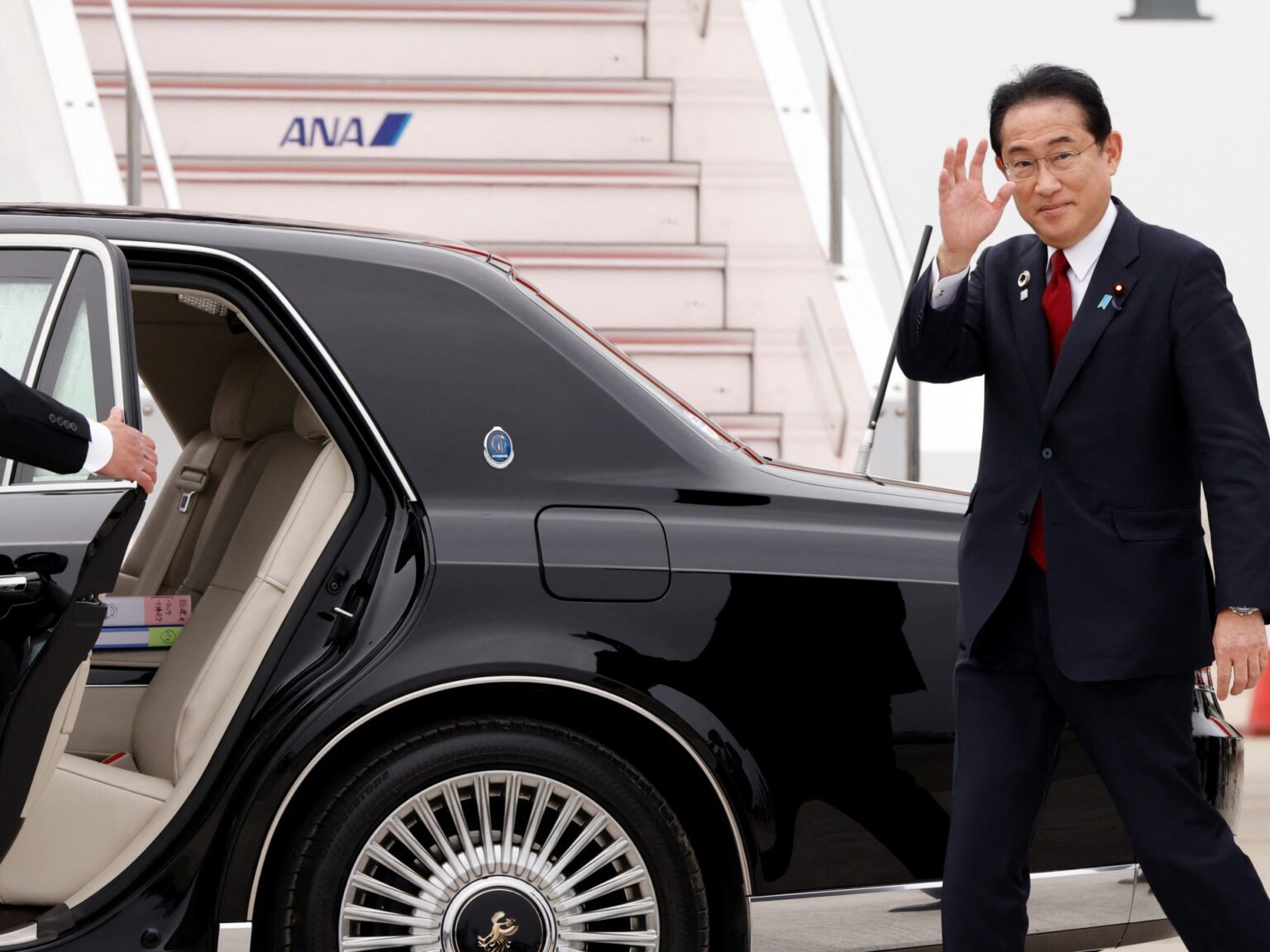Global Courant 2023-05-19 04:20:38
G7 leaders will meet in the southern Japanese city of Hiroshima for their annual summit from May 19-21.
They are expected to discuss not only economics, but also politics, and the full-scale Russian invasion of Ukraine in February 2022. China, which has become increasingly assertive in its claims in the disputed South China Sea and over self-ruled Taiwan, is likely to also pose a problem, along with North Korea’s weapons tests.
Here’s a look at the G7 and what to expect:
What is the G7 Summit?
The Group of Seven (G7) is an informal group of leading industrialized democracies with no permanent secretariat or legal status. It consists of Canada, France, Germany, Italy, Japan, the United Kingdom and the United States.
The group was founded – as the G6 – after the 1973 oil crisis as a forum for the richest countries to discuss global economic issues. The countries have a combined annual gross domestic product (GDP) of $40 trillion, representing just under half of the world’s economy.
The founding members held their first summit in France in 1975 to discuss how to handle the deep recession that followed the embargo imposed by the OPEC oil production cartel. Canada became the seventh member a year later.
Germany imposed a driving ban at the height of the 1973 oil crisis, which led to protests. The banner reads: “The rich may drive, the poor will save” (File: AP Photo))
Russia joined the G8 in 1998, but was expelled following Moscow’s annexation of Crimea in 2014.
The summits are presided over by the seven members, and this year it is Japan’s turn to host. In 2024, that will be Italy.
Two representatives of the European Union (EU) also participate, and it has become common practice in recent years for leaders from some non-G7 countries and international organizations to participate in some sessions.
The leaders discuss a wide range of topics, including economic policy, security, climate change, energy and gender.
Who is present?
This year, the leaders of Australia, Brazil, the Comoros (President of the African Union), the Cook Islands (President of the Pacific Islands Forum), India (President of the G20), Indonesia (President of the Association of Southeast Asian Nations), South Korea and Vietnam has been invited, reflecting Japanese Prime Minister Fumio Kishida’s emphasis on the importance of reaching out to developing countries, as well as US allies and partners.
The invitations to leaders outside the G7 are intended to expand cooperation to a wider range of countries.
But the economic expansion of countries such as Brazil, China and India (all members of the BRICS group, which also includes Russia and South Africa) has raised questions about the relevance of the G7 and its role in leading an increasingly more dependent on growth. outside the richest countries.
Leaders from the United Nations, the International Energy Agency, the International Monetary Fund, the Organization for Economic Co-operation and Development, the World Bank, the World Health Organization and the World Trade Organization are also on the guest list.
What is discussed?
The summit comes just days after Ukrainian President Volodymyr Zelenskyy took a whirlwind tour of Europe to meet with a number of G7 leaders.
Zelensky’s tour was designed to build political support ahead of a widely anticipated counter-offensive to reclaim land held by Moscow’s forces, and to secure new arms pledges.
G7 leaders are expected to strongly condemn Russia’s war against Ukraine while pledging their continued support for Ukraine. Zelenskyy will participate in the session via the internet.
“Support for Ukraine and sanctions against Russia will be the main topics of discussion,” Japanese Finance Minister Shunichi Suzuki said at a news conference. “We will continue to work closely with the G7 and the international community to enhance the impact of sanctions to achieve the ultimate goal of pushing Russia to withdraw.”
A group of activists take part in a protest against the G7 leaders’ summit in Hiroshima (Yuichi Yamazaki/AFP)
There will also be a focus on Beijing’s escalating threats against Taiwan, the self-governing democratic island Beijing claims as its own, and ways to reduce economic and supply chain dependency of Western democracies on China.
The seven leaders also indicated that China’s use of punitive trade measures will be high on the agenda of their three-day annual summit.
China’s use of coercive economic measures has been a growing concern in Asia Pacific and Europe in recent years, with Japan, South Korea, Australia and Lithuania all facing trade restrictions following disputes with Beijing over issues ranging from the origin of the COVID-19 pandemic to Taiwan.
For developing countries, including many former colonies of Western powers with divergent views and ties to Russia and China, the G7 will provide increased support in health, food security and infrastructure to support closer ties.
Developed countries pledged in 2009 to transfer $100 billion annually between 2020 and 2025 to vulnerable states affected by increasingly severe climate-related impacts and disasters, but that goal was never met.
According to the British NGO Oxfam, the rich G7 countries owe the poor an estimated $13 trillion in unpaid development aid and support to fight climate change.
Originally off the agenda, the rapid growth of generative artificial intelligence (AI) chatbot ChatGPT means G7 leaders can no longer ignore the problems it raises.
In April, Kishida met with the CEO of OpenAI, which developed the ChatGPT service, and EU lawmakers have urged G7 leaders to find ways to control its development.
G7 digital ministers agreed in April that they should adopt “risk-based” regulation on AI.
Choice of location
Hiroshima is the birthplace of Kishida and is known worldwide as the first city to be hit by a nuclear weapon. The bombings of 1945 helped end World War II, but destroyed Hiroshima and Nagasaki killing thousands of civilians.
Kishida’s choice of location reflects his determination to put nuclear disarmament and non-proliferation at the top of the summit’s agenda.
The road to nuclear disarmament has been made more difficult by Russia’s recent nuclear threats to Ukraine, North Korea’s repeated ballistic missile tests and Iran’s expansion of its nuclear program.
“I can’t say that the G7 will solve these non-proliferation crises, but without a coherent G7 position, we have no chance,” a senior G7 diplomat told Reuters news agency.
The leaders are also expected to visit the Hiroshima Peace Park (Androniki Christodoulou/Reuters)
Kishida on Friday welcomes arriving leaders to the Hiroshima Peace Park, the commercial and political heart of the city at the time of the bombing. He also plans to escort the leaders to the nuclear bomb museum, on the first group visit involving the heads of some of the world’s nuclear-weapon states. There may also be a meeting with survivors of the atomic bomb.
“I believe that the first step in any attempt at nuclear disarmament is to experience firsthand the effects of the atomic bomb and to firmly convey the reality,” Kishida said on a visit to Hiroshima on Saturday to review preparations. for the top to observe.
On the sidelines
Kishida, US President Joe Biden and South Korean President Yoon Suk Yeol are expected to hold a trilateral meeting on the sidelines of the Hiroshima summit to discuss North Korea, China’s assertiveness and Russia’s war against Ukraine.
Kishida and Yoon will jointly pay their respects at a Hiroshima memorial to Korean nuclear bomb victims in a confidence-building gesture as the two countries mend ties strained by disputes stemming from Japan’s 1910-1945 colonial rule on the Korean Peninsula.
Yoon was invited to the summit as one of eight outreach countries.
There have also been protests leading up to the summit,








